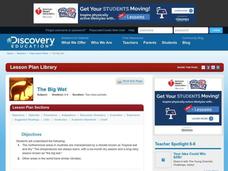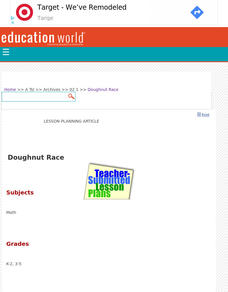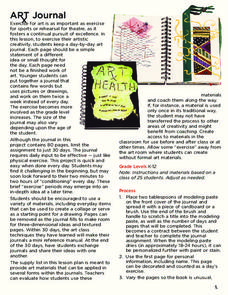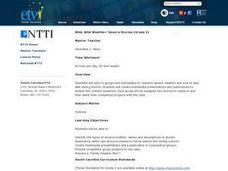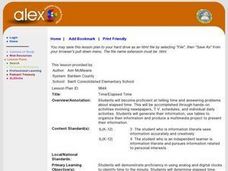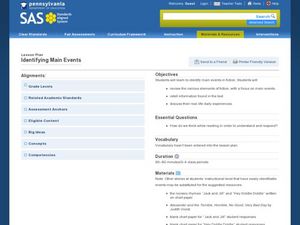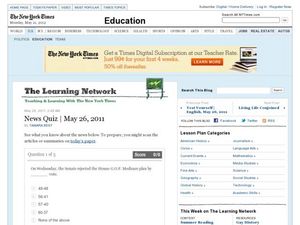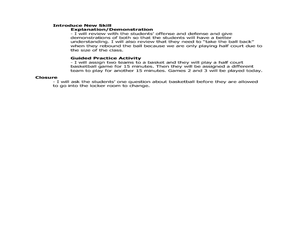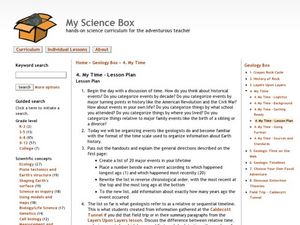Curated OER
Teen Pregnancy
Young scholars consider the implications of teen pregnancy. In this personal health lesson plan, students discuss how mothers prepare for pregnancy physically and financially. Young scholars compare their daily routines to those of young...
Curated OER
The Big Wet
Students complete a research project. In this climate lesson, students learn about the climate "tropical wet and dry" found in Australia. Students work in groups to research aspects of this climate and then create a class presentation.
Curated OER
Nonfiction Genre Mini-Unit: Persuasive Writing
Should primary graders have their own computers? Should animals be kept in captivity? Young writers learn how to develop and support a claim in this short unit on persuasive writing.
Curated OER
"Memories of Mom" Memento
Young scholars brainstorm a list of writing topics for a "Memories of Mom" book, choose one of the topics as the subject of a daily essay and combine a week of daily essays into a book to give their mothers for Mother's Day.
Curated OER
Weather, Sea Level Rise and Climate Change
High schoolers differentiate weather and climate. In this earth science lesson, students compare weather and climate in different regions of the world. They interpret weather graphs and compare isotherm lines of northern and southern...
Curated OER
Doughnut Race
Pupils will practice math facts in this fast-paced and fun "Doughnut Race." This fun activity has learners practice their math facts in a face paced game environment. It can be adapted to all mathematical operations by using a poster...
Curated OER
Electricity
Learners explore where electricity comes from and how it is used in their everyday lives. Through discussion and hands-on activities, they define electricity and explain how it travels to our homes. Students make informed choices based...
US Environmental Protection Agency
Weather and Climate: What's the Difference?
Future weather forecasters collect daily temperatures over a period of time. Afterward, they compare their data with monthly averages, as researched on national weather websites, in order to grasp the difference between weather and...
Lunch Lab
Exercise
This is the perfect resource for helping youngsters understand the importance of physical activity in their daily lives. The lesson and its worksheets focus on brainstorming a variety of fitness activities, such as games you can play...
Curated OER
What do you know about your town?
Students create a PowerPoint about the community they live in now and long ago. In this community lesson plan, students fill out graphic organizers about town events that have happened and create timelines as well.
Curated OER
Woolly Mammoth
Students learn about the woolly mammoth by reading facts and watching videos. In this woolly mammoth lesson plan, students also color pictures of woolly mammoths.
Curated OER
Ecological Footprint--How Does The Way We Live Affect Earth?
Students demonstrate an awareness of the global implications of decisions that individuals and families make about their needs and wants. They identify environmental and health issues related to the production and consumption of food....
Dick Blick Art Materials
Art Journal
Here's a prescription for creativity—keep a daily art journal. Words, images, shapes, objects, all can be used as prompts that exercise the creative imagination. Set aside a couple of moments each day for this engaging activity.
Curated OER
Wild, Wild Weather: Severe Storms
Second graders research dangerous weather and how they can stay safe. In this environment lesson, 2nd graders view video clips and research the Internet to identify the different types of severe weather storms. Students complete a...
Curated OER
Time/Elapsed Time
Young mathematicians complete various activities to demonstrate proficiency in telling time and identifying elapsed time. They analyze and discuss television schedules, create a booklet about their daily activities, produce a TV. guide,...
Curated OER
Identifying Main Events
Help kindergartners learn to identify the main events in fiction. They will review elements of fiction, retell information found in the text, and discuss their real-life daily experiences. All the while, they will be asking themselves...
Curated OER
News Quiz l May 26, 2011
Although this online current events quiz is based on May of 2011, it offers a chance for scholars to sharpen their media literacy skills and is available on a daily basis on this site. There are five multiple-choice questions covering a...
Curated OER
Biodome
Students make a biodome out of a recycled soda bottle. In this biodome lesson plan, students make a self contained environment for a plant to grow and watch the plants growth.
Curated OER
Basketball/Tumbling
Learners play basketball games and show knowledge of offense and defense. In this basketball lesson plan, students also answer short answer questions about offense and defense.
Crafting Freedom
F.E.W. Harper: Uplifted from the Shadows
What is stereotyping, and how do we handle stereotyping in our daily interactions? Your young historians will not only have the opportunity to learn about the first African American woman to publish a short story–Frances Ellen...
Curated OER
Globalization and Consumerism
Is the expansion of American corporations abroad a good or bad thing? After examining the global operations of Ford Motor Company, McDonald's, and Walmart, class members are asked to evaluate the impact of globalization and consumerism.
Curated OER
Becoming a Member of an 1830s Family
Students compare and constrast life in an 1830s family verses a modern family. They role play the position of a family member in 1830 while wearing traditional clothing for the time period. They write journal entries to show their daily...
Alabama Learning Exchange
Miss Integer Finds Her Properties in Order
Access prior knowledge to practice concepts like order of operations and exponents. Your class can play this game as a daily review or as a warm-up activity when needed. They work in groups of four to complete and correct review problems.
Curated OER
My Time!
Learners explore how to tell time by looking at their daily schedule. Everyone's days start out the same (with school), but what does each learner do after school? How do they spend their time?



